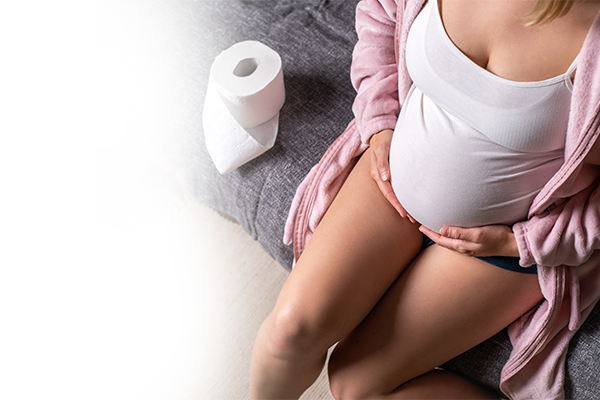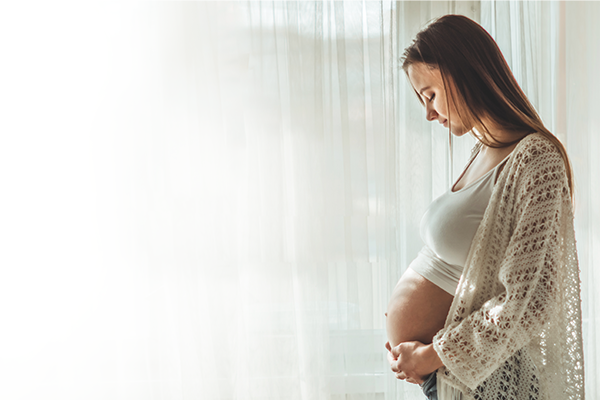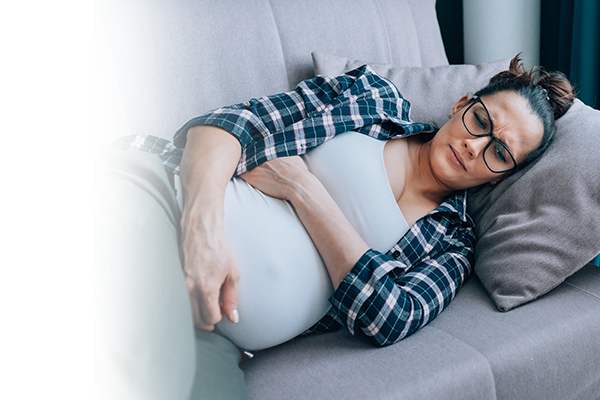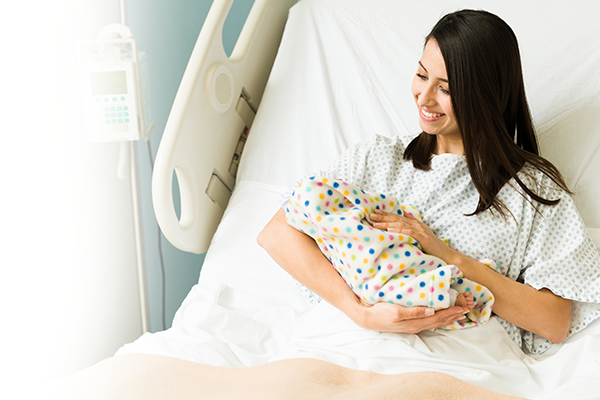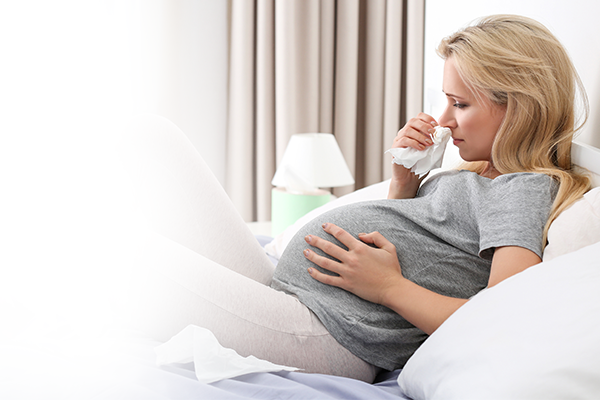Hemorrhoids in pregnancy are a common problem faced by pregnant women, especially in the second and third trimesters. The phenomenon is most often caused by chronic constipation and uterine growth, which increase pressure in the veins lining the anal canal. However, it is worth knowing that it is possible to significantly reduce the risk of their occurrence. How? We answer!
Hemorrhoids – what are they?
Hemorrhoids, or bleeding nodules, are a physiological structure of the rectum, sealing the lumen of its canal and facilitating control of bowel movements. Vascular structures, composed of arteriovenous connections and connective tissue, only under the influence of inflammation and other unfavorable exogenous and endogenous factors cause annoying discomfort and unpleasant symptoms. They are formed in the course of digestive diseases and as a result of a sedentary lifestyle and an unbalanced diet. This affliction not infrequently affects pregnant women as well.
Hemorrhoids in pregnancy – types
In medicine, four degrees of clinical progression of hemorrhoidal disease are distinguished.
- Grade I – varices do not extend beyond the anal canal and are visible only on anoscopy. In this case, the only medical recommendations are usually limited to dietary changes.
- Grade II – hemorrhoids remain in the rectal canal. They may periodically fall out of it when trying to push, but they retreat spontaneously. During this stage, the first symptoms associated with the condition are heralded, such as, among others. Bleeding or anal itching and pain.
- Grade III – this is when the nodules move outward during pushing, and after defecation they can be easily drained with the hand (manually). What’s more, they don’t just fall out during a bowel movement, but also during physical activity or carrying heavy things.
- Grade IV – the lesions are outside the rectum and there is no way to drain them. This is the most advanced form of this abnormality and may then be accompanied by, among other things. Bleeding, acute pain and fecal incontinence. This stage very often already requires surgical procedure to remove the resulting nodules.
Anal bleeding nodules in pregnancy – causes
Anal varices can be particularly troublesome during pregnancy. This common phenomenon is associated with an increase in venous pressure, caused by the pressure of the uterus on the blood vessels of the abdomen and pelvis. The increase in pressure in the veins located in the rectal area causes a slowdown in blood flow inside them. Such a condition is further responsible for the appearance of various dilations and deformations of the vessel walls of a varicose nature due to the impaired ability of the vessel to drain excess blood.
Chronic constipation, slowed metabolism and reduced physical activity are also common causes of hemorrhoids during pregnancy. In addition, they may be the result of increased levels of progesterone, the hormone responsible for the elasticity of blood vessel walls, fluctuations of which promote their expansion and rupture. Bleeding nodules also not infrequently appear after childbirth against a background of increased pressure created during strong contractions and labor pushes.
Anal varices – how do they make themselves known?
The symptoms of hemorrhoids and their intensity depend largely on the depth of the varicose veins. Internal hemorrhoids usually cause non-painful rectal bleeding during or just after a bowel movement. It is possible to observe oozing of mucous secretions and their settling on the passed feces. Only the externalization of pathologically altered bleeding nodules causes a burning and itching sensation of the anus and fecal incontinence. Occasionally there is pain. External hemorrhoids in pregnancy, on the other hand, mean an intensification of existing complaints. Severe pain is caused by progressive venous thrombosis. There may also be a feeling of incomplete bowel movements. The affliction causes difficulties in hygiene, and often the lesions irritate the surrounding skin, making it difficult to sit and rest comfortably.
What do external hemorrhoids look like? They come in the form of red nodules that can be felt with the hand. Internal ones, on the other hand, are invisible and are usually detected by the doctor during a transrectal examination with his finger. Hemorrhoid ointment for pregnancy and other non-invasive methods do not always cause symptoms to subside and changes to regress. Therefore, from the beginning of the first trimester, it is worth introducing prevention of anal varices.
Pharmacological treatment of hemorrhoids
Medication therapy is determined by the severity of the disease and the severity of the accompanying ailments. It is worth knowing that the peculiarities of the pregnancy period not infrequently make it impossible to take certain agents and ointments, so natural methods are the most preferred form. However, if necessary, the doctor may decide to take drug treatment for the pregnant woman , and it is important to remember to always use this type of preparation under his care – whether with or without a prescription.
What medications to use for bleeding nodules during pregnancy?
- Procto-Glyvenol (suppositories/cream) – from 4. month of pregnancy;
- Hemorectal (suppositories) and Procto-Hemolan (cream) – only when a specialist determines that the therapeutic benefits outweigh the potential risks to the fetus;
- Posterisan H (suppositories) and Procto-Hemolan Control (tablets) – only when the doctor determines that taking this medication is an absolute necessity;
- Posterisan (ointment/ suppositories) – ask your doctor or pharmacist before taking it, as at this point we do not have enough data on the use of this drug by women during pregnancy.
Hemorrhoids in pregnancy – surgical treatment
In most cases, surgical intervention is unnecessary due to the fact that the nodules spontaneously resolve after delivery. For this reason, conservative treatment until resolution is usually recommended. Nevertheless, sometimes a mother-to-be must undergo surgical treatment, especially when a thrombosis has occurred within the bleeding nodule. This clot is usually removed in an outpatient setting, which means that the patient does not have to stay in the hospital for more than a few hours. This is a procedure that relieves unpleasant pain, not the problem itself.
Hemorrhoidal disease – how to treat it at home?
As we have already mentioned, the safest treatments for moms-to-be are the natural ones, which do not require either medication or the use of a scalpel. For hemorrhoids, hot water so aks can be very helpful, which should be done several times a day. In addition to this, it is recommended to make soaks in a decoction of oak bark or witch hazel. If you do not like this form, you can easily replace it with compresses of such an extract, which should be changed several times a day.
Have you ever heard of ice packs? Although they bring temporary relief, they are definitely not worth doing, as they can increase the risk of a blood clot within the nodule, and this often requires surgical treatment. On the other hand, proper hygiene of the anal area and, above all, the use of gentle and odorless toilet paper can alleviate the course of hemorrhoidal disease. At that time, it is recommended to avoid lifting heavy objects and staying too long in a sitting position. If the mother-to-be feels like resting, she should assume a lying position, preferably on her left side. It is also important to refrain from heavy pushing, as it increases the pressure in the anal canal and increases the volume of already formed nodules.
How to avoid hemorrhoids during pregnancy? – prevention
What is the prevention of hemorrhoids during pregnancy? One of the most essential elements is a proper diet to ensure optimal intestinal peristalsis and thus prevent constipation and bloating. Therefore, it is worth including in your menu products rich in dietary fiber, which regulates the digestive system. These include:
- buckwheat and barley groats,
- rye bread,
- brown rice,
- bran,
- cereal – wheat and rye,
- Various kinds of grains and seeds.
First of all, the body should be hydrated, because too hard stools provoke strong push and intense pressure of the fecal mass on the walls of the anal canal, which promotes irritation of the bleeding nodules. It is also not worth forgetting about moderate physical activity – the right dose of exercise, adapted to the stage of pregnancy and the woman’s condition improves intestinal motility, strengthens the muscles of the pelvic floor and helps alleviate other pregnancy discomforts.
In the prevention of hemorrhoidal disease in pregnancy, the frequency of bowel movements plays a major role. It is not advisable to avoid defecation, although this process may be accompanied by unpleasant symptoms. Fear of pain and bleeding often leads to a vicious cycle, which in turn significantly worsens the course of this condition.
FAQ:
- How do hemorrhoids form during pregnancy?
Most often, these nodules are formed because there is an increase in venous pressure during pregnancy, caused by the pressure of the uterus on certain abdominal and pelvic veins. This phenomenon, in turn, causes the blood flow inside them to slow down, and the pressure in the supply veins to increase.
- How to treat hemorrhoids during pregnancy?
Therapy of this condition during pregnancy is mainly based on conservative methods. In more serious cases, however, the doctor may recommend starting pharmacotherapy with ointments, suppositories and, if necessary, pills. When a woman manifests thrombotic complications, surgical intervention may be necessary.
- Is it safe to use hemorrhoid medication during pregnancy?
Most available medications are not intended to be taken during pregnancy. This is due to a lack of research than the sheer harm they cause. If conservative treatment has failed, pharmacotherapy may be unavoidable. It is very important that it is carried out under the care of a doctor, who will assess whether the therapeutic benefits outweigh the risks.
BIBLIOGRAPHY:
Rate this article:



